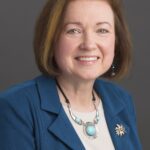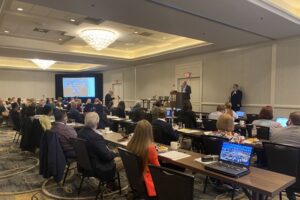Volume 35 Number 6 | December 2021
Deb Rodahl, MBA, MLS(ASCP)CM, ASCLS Today Editor

This issue would not be complete without a reference to the annual Laboratory Legislative Symposium hosted by ASCLS. ASCLS is proud to work with the Clinical Laboratory Management Association (CLMA), American Society for Clinical Pathology (ASCP), Association of Genetic Technologists (AGT), American Medical Technologists (AMT), the National Society for Histotechnology (NSH), and the Philippine Association of Medical Technologists-USA (PAMET-USA) on the symposium each year. Through this ASCLS tradition that originated in 1989, members of these organizations meet with their representatives and senators on Capitol Hill as a unified front on behalf of our profession. Each year these leading organizations urge their members and leaders to come to Washington to provide a visible and informed voice, and make our concerns known inside Congress. The purpose of the symposium include:
- Discuss current and proposed federal legislation, and recently passed laws that impact clinical laboratories, including reimbursement for diagnostic testing and federal oversight of laboratory developed tests.
- Review ways laboratory professionals can most effectively voice their concerns and impact the legislative process.
- Review regulations that affect current and future practice in clinical laboratories.
- Recognize how changing standards might affect clinical laboratories.
- Explain how increasing demand for more testing and more complex testing will outpace the small increases in graduates from current training programs over the coming decade.
Symposium attendees are coached on presentation techniques so they can effectively talk to their congressional representatives during their appointments, and they are well received in the congressional offices. Attendees return home from Washington with first-hand knowledge of the political system in action and confidence that they make a difference. The primary topics for the 2021 symposium included:
- Workforce: ASCLS believes there may be resources available in the current infrastructure bills. There is a bill from Senator Smith that addresses allied health and includes the laboratory workforce, but it’s small. There are likely other bills floating around that would help.
- PAMA/Reimbursement: ASCLS is likely to support an initiative to try and get Congress to stop any additional cuts under PAMA until the end of the declaration of the pandemic.
- Laboratory-Developed Test (LDT) Regulation: There is a bill called VALID that ASCLS is likely to come out in support of. It would create a risk-based structure, giving the FDA clear authority to regulate high risk LDTs that are sold/used outside the laboratories in which they are developed.
Thank you to everyone for being labvocates in your daily work!
Deb Rodahl is retired but formerly was Vice-President of Hospital Operations at St. Joseph’s Hospital in St. Paul, Minnesota.
Nearly 120 professionals from six laboratory organizations came together in person and virtually for the 2021 Laboratory Legislative Symposium to learn how to advocate for the profession and make their voice heard on Capitol Hill.
